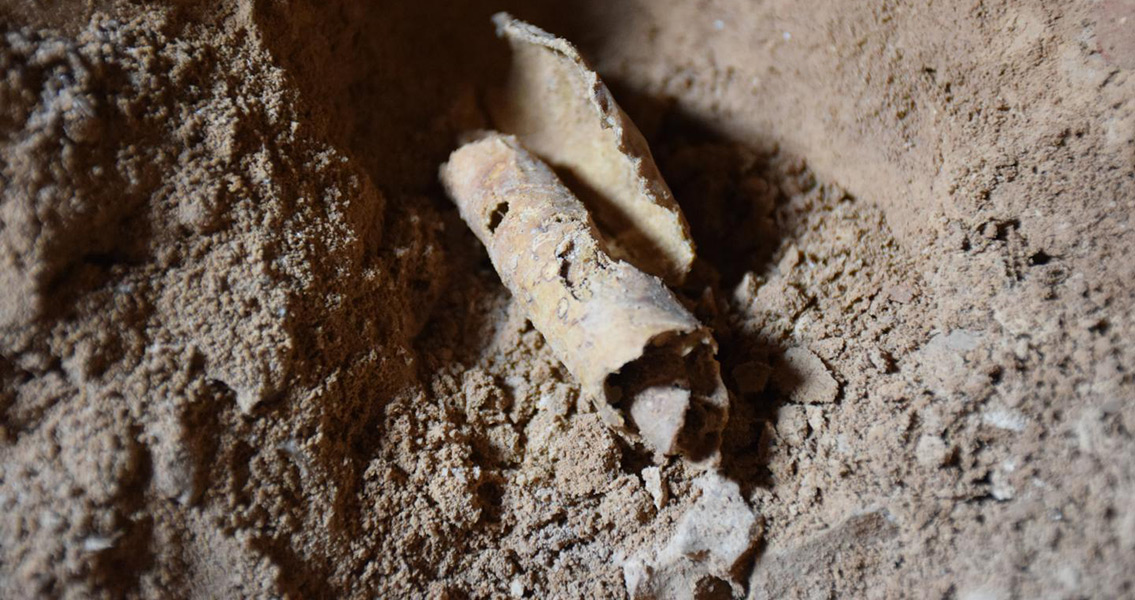<![CDATA[Archaeologists working in Israel claim to have reached a new milestone in the study of the Dead Sea Scrolls, with the discovery of a new 'scroll cave'. Scholars suggest that this new cave, situated on the cliffs west of Qumran, near the northwestern shore of the Dead Sea, should be labelled the twelfth Dead Sea Scroll cave. Excavation at the remarkable new cave revealed that Dead Sea Scrolls from the Second Temple Period had been hidden inside but were looted at some point in the mid-twentieth century. It's a surprising discovery which adds to the already long and fascinating story of the Dead Sea Scrolls. Many historians, archaeologists and theologians consider the Dead Sea Scrolls to be the most important archaeological find of the twentieth century. The remarkable body of texts includes some of the oldest known biblical manuscripts, as well as a plethora of other religious and non-religious documents. Dr. Oren Gutfeld and Ahiad Ovadia from the Hebrew University of Jerusalem's Institute of Archaeology, in collaboration with Dr. Randall Price and students from Liberty University in Virginia, USA, carried out the study of the twelfth Dead Sea Scroll cave. They are the first archaeologists to unearth and thoroughly excavate a new Dead Sea Scroll Cave in over sixty years. It was soon revealed that the cave had once contained Dead Sea scrolls. A host of storage jars from the Second Temple Period were found hidden in niches running along the cave's walls and deep down into a long tunnel at the rear. All of the jars had been broken and raided, their contents removed. As the excavation was drawing to a close, the excavators discovered a pair of iron pick axe heads they dated to the 1950s, strongly suggesting the cave had been looted. Previously it was believed that only eleven caves contained Dead Sea Scrolls. The scholars behind the latest discovery argue that the new cave should be labelled Cave 12. It will receive the designation Q12, the Q signalling that no scrolls were found in the cave. "This exciting excavation is the closest we've come to discovering new Dead Sea scrolls in 60 years. Until now, it was accepted that Dead Sea scrolls were found only in 11 caves at Qumran, but now there is no doubt that this is the 12th cave," said Dr. Gutfeld, the director of the excavation. "Finding this additional scroll cave means we can no longer be certain that the original locations (Caves 1 through 11) assigned to the Dead Sea scrolls that reached the market via the Bedouins are accurate." More than just smashed storage jaws were found at the site. Fragments of scroll wrappings, a string that tied the scrolls and a piece of worked leather that had once been part of a scroll were also discovered in the cave. "Although at the end of the day no scroll was found, and instead we 'only' found a piece of parchment rolled up in a jug that was being processed for writing, the findings indicate beyond any doubt that the cave contained scrolls that were stolen." explained Dr. Gutfeld. "The findings include the jars in which the scrolls and their covering were hidden, a leather strap for binding the scroll, a cloth that wrapped the scrolls, tendons and pieces of skin connecting fragments, and more." The excavations at Dead Sea Scroll cave twelve were performed as part of 'Operation Scroll', a new initiative launched by the Israeli Antiquities Authority to undertake systematic surveys and cave excavations in the Judean Desert. Along with IAA, the work received additional support from the Civil Administration of Judea and Samaria, and the Israel Nature and Parks Authority. The project hopes to provide new evidence for archaeologists studying Qumran and the Dead Sea Caves. "The important discovery of another scroll cave attests to the fact that a lot of work remains to be done in the Judean Desert and finds of huge importance are still waiting to be discovered," said Israel Hasson, Director-General of the Israel Antiquities Authority. "We are in a race against time as antiquities thieves steal heritage assets worldwide for financial gain. The State of Israel needs to mobilize and allocate the necessary resources in order to launch a historic operation, together with the public, to carry out a systematic excavation of all the caves of the Judean Desert." Photo courtesy of Casey L. Olson and Oren Gutfeld]]>
New Dead Sea Scrolls Cave Unearthed, But Where are the Scrolls?
